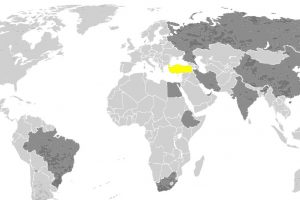Türkiye has a serious racism problem and this malignant psychological phenomenon existed even before the arrival of Syrian and other migrants. At the time (and now passively), a self-proclaimed modern community in Turkish society, who are quite influential in the country, excluded the rest of the society, which included many groups from conservatives to Kurds.
Regarding racism, it is often confused with nationalism and patriotism. It is an excellent trait to love one’s own nation. However, racists marginalize others by creating another nation within the country. They exclude others if they are in power. If not, they try to live in a virtual colony away from others.
On the other hand, unlike their claims, racists are not patriotic. Those who insult tourists just because they are from another nation, discouraging them from coming to the country and damaging their economy, can not be patriots. Tourists do not come to stay permanently. When they come, they stay for a while and leave money behind. Can a patriot attack foreigners who contribute to his country’s economy?
No ethics involved
Racists also have moral problems. If a person insults, injures, kills or ostracizes others who do not harm them, their humanity should be questioned before their nationality. It is one thing not to want foreigners in one’s homeland and another to harm them. It is cowardice and a crime to act as a group and attack the weak to harm them.
Racists often come from among people who feel they are second class. Some people with a low level of education and weak financial status feel downtrodden in their society. They seek an easy way to level up among social classes and embrace racism. They seek satisfaction by oppressing native people or immigrants who are in a worse social class than themselves.
Because for them, migrants are third class. Being second class themselves, they try to alleviate the discriminatory pressure of the first class by stepping on the third class. So, the self-creation of a lower class is an opportunity for them. It is important to note that the first class is also racist, but they reflect it over both the second and the third class in a different way.
Moreover, many of the reasons racists give to justify their racism have no basis. For example, the claim that immigrants cause unemployment is not true. Immigrants have come to this country in the last 10 years and the unemployment rate in the period of their arrival is one point lower than in the previous 10 years. This is because most of them are either doing jobs that Turks do not want to do or they are working in businesses that they have established themselves.
There is also no cultural invasion. For one thing, a more advanced civilization does not imitate a more backward civilization (if migrants are so). Those who come from behind always imitate those who are ahead. This will happen in Türkiye, too.
One of the handicaps of racism is that whatever they accuse immigrants of, they themselves do the same. They complain about illegal immigrants entering their country, but at the same time, they flee to Europe illegally. Or they stay there even though their visa has expired. They do not mind being immigrants there. One wonders whether they will return if migrants go back to their countries.
Some of the legitimate complaints of the anti-immigrant people, whom we can categorize as anti-immigrant rather than racist, can be accepted to some extent. No society can absorb a massive and short-term wave of migration, regardless of where it comes from. It must be accepted that the public has been traumatized. However, the public, when criticizing the government’s migration policies, also needs to understand that the government’s hands are tied by conscience and the conditions of the war ongoing in Syria.
Source: Daily Sabah






